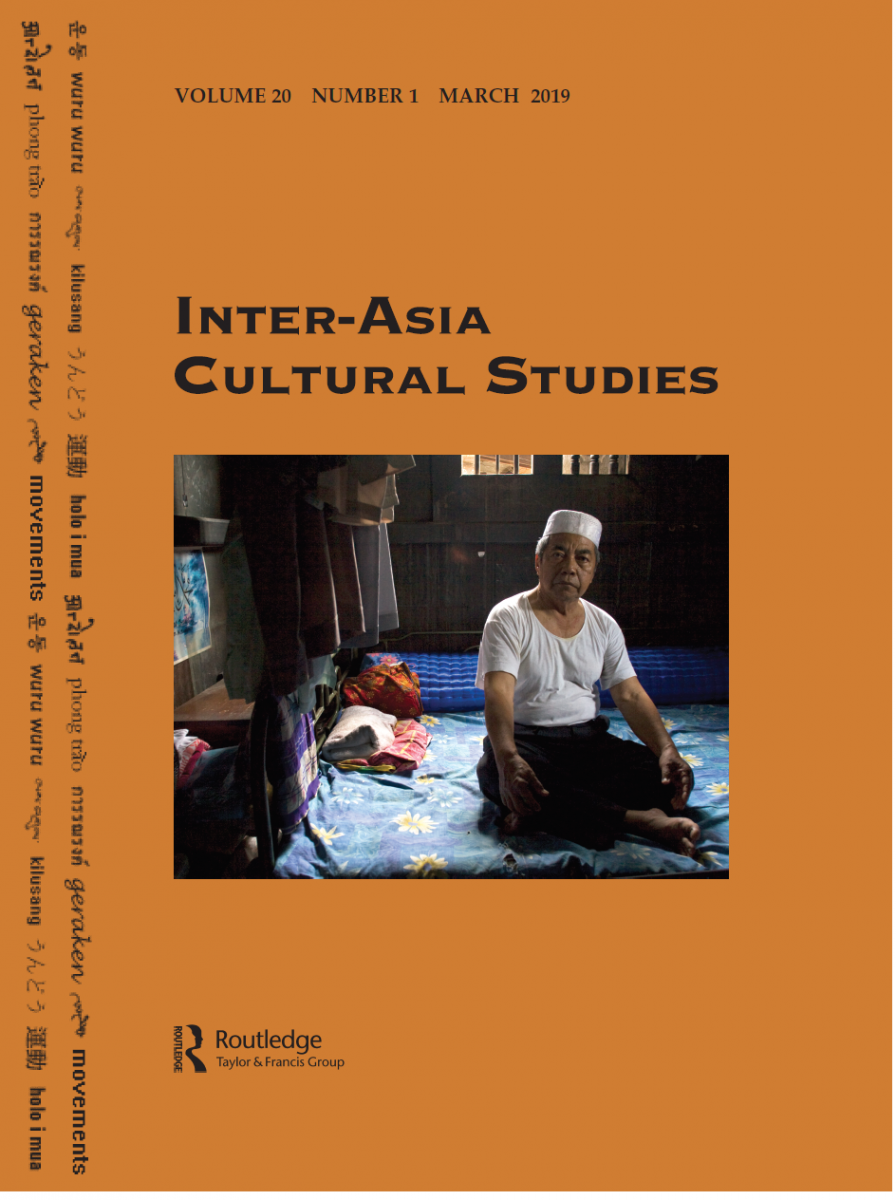

【出版】Inter-Asia Cultural Studies: Movements Volume 20 Number 1 March 2019
2019-03-28

Editorial statement
Inter-Asia Cultural Studies, also known as the Movements project, is a transborder collective undertaking to confront Inter-Asia cultural politics.
The question of culture is among the most important yet difficult facing Inter-Asia today. Prolonged histories of feudal ideology, patriarchy, heterosexism and, within as well as between countries, racism and discrimination against subjugated peoples continue to block struggles for popular democracy. Long-term complex-antagonisms generated by the uneven histories of global capitalism, colonialism and imperialism, the imposed nation-state structure and regressive forms of nationalist identity politics have rendered meaningful dialogues within the region very difficult. At the same time, the globalization and regionalization of technology, economy and cultural production, and the recent breakdown of the Cold War structure, have opened up a unique moment for dialogues within Asia and internationally. Unfortunately, this potentially generative moment has been met with triumphalist sentiment.
Since the 1980s, a pervasive rhetoric of the “rise of Asia” has come to mean more than the concentrated flow of capital into and out of the region. It has come to constitute a structure of feeling that is ubiquitous yet ambiguously felt throughout Asia. Historically, this feeling of the “rise of Asia” is complicated by the region’s colonial past. While Asia’s political, cultural and economic position in the global system will continue to fluctuate, there is a need to question and critique the rhetorical unities of both the “rise” and of “Asia.” Wealth and resources are unevenly distributed and there is no cultural or linguistic unity in this imaginary space called Asia. On the other hand, no matter whether there are common experiences shared by sub-regional histories, there is an urgent need for forging political links across these sub-regions. Hence, “inter-Asia” cultural studies.
The politico-economic transformations across the region in the Post Cold War era have engendered both new social movements and critical cultural studies as forces of decolonization. These forces have given rise to alternative modes of knowledge production, and yet no adequate means exists for the circulation of intellectual work and for interaction among critical intellectuals.
It is at such a pivotal conjuncture that Inter-Asia Cultural Studies has emerged as part of a movement for the ongoing construction and reconstruction of critical Inter-Asia subjectivities. It gives a long overdue voice to the intellectual communities in the region and recognizes its own existence as an attempt to continue critical lines of practices. The journal’s aim is to shift existing sites of identification and multiply alternative frames of reference: it is committed to publishing work not only out of “Asia” but also other coordinates such as the “third world.” Its political agenda is to move across: state/national/sub-regional divisions, scholarship and activism, modalities/forms of knowledge, and rigid identity politics of any form. These movements actively engage with local cultural politics within an ever-changing international environment, where politics is increasingly operating in the sphere of culture, under the dictates of a global cultural industry, mediated by new electronic and information technologies, and shaped by different forms of representation – visual, virtual, financial. This new situation has brought political economy, culture and politics together in different ways, and forced us to create new ways of thinking and acting. For this reason the project is more interested in generating new questions or finding ways of asking questions differently, than providing fixed answers.
Toward these ends, Inter-Asia Cultural Studies will serve as a link between critical intellectual groupings; we are actively building connections with journals and groups in different locales.
Kuan-Hsing Chen and Chua Beng Huat
Inter-Asia Cultural Studies: Movements
Volume 20 Number 1 March 2019
Editorial statement
Essays
Reading Myanmar’s inland fisheries: postcolonial literature as theoretical lens
Stephen CAMPBELL
Fear as political dynamics: Chinese peasant workers’ struggle over social security
Wei SHI
Creative labor as moral and ethical subjects: Creativity City Yokohama, Japan
Changwook KIM
Autogenous culture as political form: explorations through participatory art in Singapore
Felicia LOW
Imagining accidental fetal citizens: pregnant Mainland women and the cultural politics of birthright citizenship
Tsung-yi Michelle HUANG, Chun-kai WOO, Yen-fu LAI
Is the postwar state melting down?: an East Asian perspective on post-Fukushima Japan
NAM Kijeong (translated by LEE Min Jeong, NAM Kijeong, Benjamin A. ENGEL)
Visual essay
Photography and Chineseness: reflections on Chinese Muslims in Indonesia
ZHUANG Wubin
Third-world connection
Yugoslavia: other modernities, other histories
Bojana PIŠKUR
Art education
Crisis of the human and responsibilities of art/education
GAO Shiming (translated by WANG Chih-ming)
Field note
Chongming islanders in great Shanghai: an investigation of cultural ecology
ZHU Shangje (translated by ZHU Qiaolian)
近期新聞 Recent News


